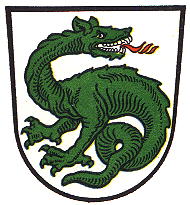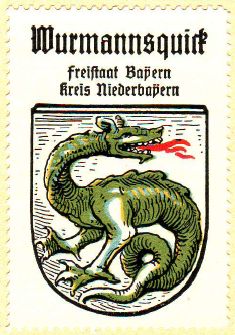Wurmannsquick: Difference between revisions
Knorrepoes (talk | contribs) m (Text replace - "[[Literature" to "{{media}} [[Literature") |
Knorrepoes (talk | contribs) m (Text replace - "The arms in the Kaffee Hag albums +/- 1925 " to "The arms by Hupp in the Kaffee Hag albums +/- 1925 ") |
||
| Line 23: | Line 23: | ||
{|align="center" | {|align="center" | ||
|align="center"|[[File:wurmannsquick.hagd.jpg|center]] <br/>The arms in the [[Kaffee Hag albums]] +/- 1925 | |align="center"|[[File:wurmannsquick.hagd.jpg|center]] <br/>The arms by [[Otto Hupp|Hupp]] in the [[Kaffee Hag albums]] +/- 1925 | ||
|} | |} | ||
Revision as of 07:45, 21 November 2014
| Heraldry of the World Civic heraldry of Germany - Deutsche Wappen (Gemeindewappen/Kreiswappen) |
WURMANNSQUICK
State : Bayern
District (Kreis) : Rottal-Inn (until 1973 Eggenfelden)
Additions : 1971 Hickerstall, Martinskirchen
Official blazon
In Silber ein widersehender, feuerspeiender grüner Lindwurm.
Origin/meaning
The dragon is a canting element (Lindwurm in German) and appears first on a seal dating from 1477. It has been stated that the arms were officially granted in the 15th century by the Dukes of Bayern-Landshut, but this can not be proven.
Even though the composition as such has not changed, many different variations of the arms are known. In the 16th century the worm was once shown as a panther. The colours have changed during the centuries, but have not been changed since 1811.
| The arms by Hupp in the Kaffee Hag albums +/- 1925 |
Contact and Support
Partners:
Your logo here ?
Contact us
© since 1995, Heraldry of the World, Ralf Hartemink 
Index of the site
Literature : Stadler, 1964-1971, 8 volumes; Hupp, O: Kaffee Hag albums, 1920s












